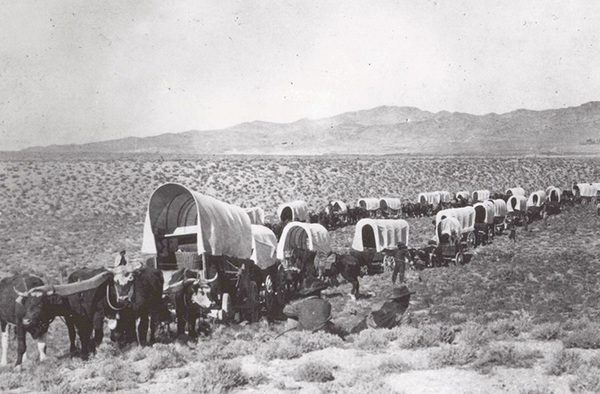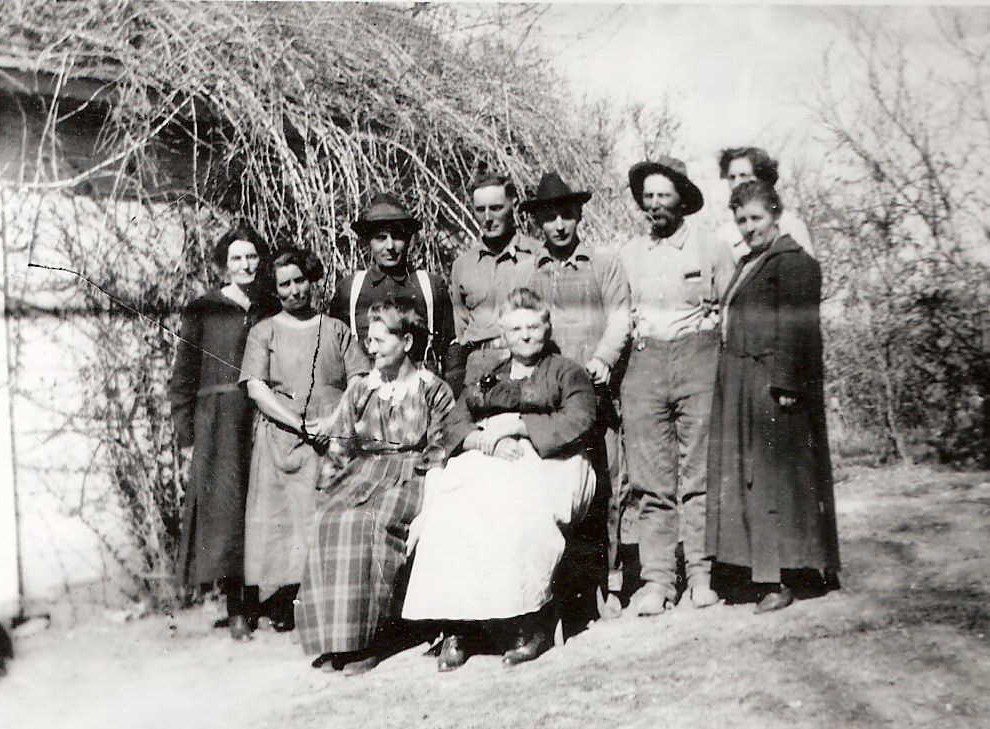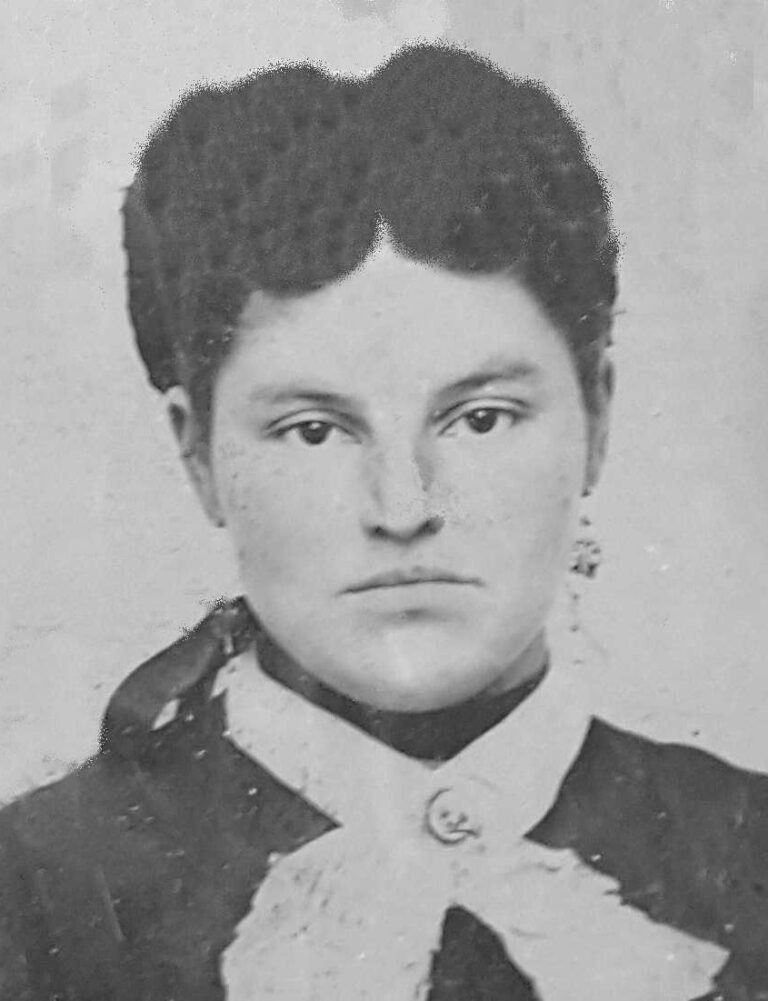The following account was written by Sarah A. Manwaring (transcribed from the original by family) as she and her family crossed the plains to Oregon Sarah A. Manwaring was born in Mendota, LaSalle County, Illinois on the 15th day of October 1854. We lived on a farm until the spring of 1861 then my father moved to Chicago, Illinois and ran a butcher shop. We stayed there until the spring of 1864 then moved again to Edgenwood, Illinois. I was 10 years old in the fall of 1864 and had to help on the farm as my brothers were gone. One was struck by lightning and died in 1859. When my father and one brother went to California they got back home in December 1860. They had to come back without their mules and wagons. After they started back and camped one night they turned the mules in the enclosure, someone stole them. They came back by way of New York and brought my cousin, Miss Sara A. Hunt with them. In December my sister Ann got married and they lived on a farm five miles from fathers. In April my only brother was married to his cousin, Sara A. Hunt and lived on the farm for two more years and then they went to New York and stayed for two years. My brother came back home then with his health broken by working in a gas laundry and he stayed on at the farm with father until the spring of 1869 and then we started across the plains with three wagons and ten mules and horses. On the 12th day of April 1869 we traveled one day from home and got in with two more wagons. This made five wagons in all. We traveled along fine until we came to the Big Blue River and we camped there on Sunday. I cannot remember the name of the town, but it was a beautiful place. We camped close to the river and fished until noon. During that time there was a very mean looking man came and tried to persuade Father to take a certain route, but my father told him that he had crossed the plains before. On Monday morning we hooked up and again started on our journey and traveled until Tuesday evening when a woman came to our camp and wanted to know if she could get in with some of us. My father told her that he did not have room as there was 13 of us-big and small. The next morning se got in my brother-in-law’s wagon and on Wednesday everything went fine. Thursday morning the antelope were quite thick. They ran up to the wagon and my brother took his carbine and said he was going to have one of them. The other boys did the same. We girls and my sister-in-law drove the teams. Father and a boy 16 years of age was all that was left in the wagons to drive slowly along. All at once my sister looked out of the wagon and saw lots of men on horseback and she told father they were soldiers and he made the expression, “Soldiers be Damned, Indians.” Just before she saw them all the others had come back to the wagons except my brother Tom. Father waved his hat for my brother to come but he went on over the hill and that was the last we ever saw of him. This woman that came to the train said to just hang out a flag of truce and give them some sugar and they wouldn’t hurt anyone. Father told her to shut up or out she would go. We traveled on and the Indians circled around us three times but didn’t get anyone else or anything but my only brother. Well we traveled on until about four o’clock without stopping and we came in sight of a wood choppers camp and there were two blood hounds chained to their tents. We camped as close as we could until the men folks came. There were eight of them. When we told them what had happened and about my brother they said they had not seen any Indians for a long time and they didn’t know where they came from. We told them of the woman with us and they said that she was a spy. We stayed three days at the wood choppers camp and then six soldiers came along that night and we told them of our loss and they were looking for six deserters and they came back the next day with them. They found them under an old Government wagon box. We passed the same box but never saw anyone. On Saturday and Sunday the soldiers and wood choppers hunted all over the same grounds where my brother was missed but they could never find any trace of him. They found an Indian medicine bag and they said my brother-in-law, when he shot, must have hit one of the Indians. In the meantime, while we were camped one Sunday evening, there came 14 more wagons to travel with us. This made 19 wagons. It was on the 23rd day of May 1869 that my brother was captured.

Well on Monday morning we all got ready to start on again, but just as an old gentleman was hooking his mules up one of them kicked him just above the temple so they had to start right out for the fort. We were 25 miles from Fort Kearney and the rest didn’t get there until about three in the afternoon. When we got there we were met by some soldiers and they told us that the old gentleman was alright but came very near bleeding to death. They told us not to camp within a mile of the fort and we told them we had a woman we wanted to get rid of. They wanted to know if she could cook and we said yes. So they came and got her. The next morning they came to see if she had come back to the train. They said she was gone. They wanted to know if we had seen a man with a six oxen team go by where we were camped. They said perhaps that was how she got away them. That night the soldiers came with their brass band and played but oh, my heart was broken. I went into the tent and cried until I could not cry anymore. The rest of the young folks danced on the ground. Next morning we all started again and when we got to Platte City we crossed the river. There was an old lady there that her husband had been killed by Indians. She wanted to go to California but the folks where she was staying wouldn’t let her go. (It was some of her folks.) I can’t write a full description of our travels across the plains but we traveled along all right until we got to the crossing. The south Platte was the river. We had quite a time. My father’s mules took nearly all of the 19 wagons across. They mired down and didn’t want to stop in the water like the other horses did. If we stopped a minute the quick sand would stop the wheels from turning. There had to be a man at each wheel to help start the wagons. We traveled along all right until we had to cross the North Platt at Fort Fredsteel, and there we had to take the wagon boxes off and run them across on hand cars on the railroad track. It took all day long but we got over it alright. We had to cross on a foot bridge on the railroad tracks and I would get dizzy. The men had to swim the horses over. Some of the boys would cling to the horses tails and make the horses pull them across. They got everything across and the next morning the soldiers saw Indians on the hills and they were soon mounted and riding. They came back and said that they were just on their trails through the woods and hills. There was a man there that had a wife that had been shot in the arm and she died. He wanted us to do some washing for him but we couldn’t as the train was going out as soon as the soldiers got back with the news that the Indians were gone. We traveled on again and had no trouble until there was a lady got shot by accident while putting her gun into the wagon, but it was not serious. Sometimes we have to travel all day long with no water only a few gallons in a keg. We would have to travel in the night at times so as to get where there was water and then let the horses rest and feed a while. We would travel early and late when it hot. I can remember when we got to a river called —Fork, the men folk were all sick with a slight billious spell and we women folk had to do all the work. Just as it happened there came a doctor traveling through the country. He gave the men some medicine and they were ready to start on the next day. In the meantime there was a baby born on the train. We all got ready to cross the river and they didn’t think it was so deep. One man ventured through with his provisions in his wagon and when he got in the middle of the stream the water ran in the wagon bed. He had several boxes of crackers and they got all wet. After all 19 wagons crossed it was in the afternoon so they concluded to take the crackers out and try and sun dry them until evening and then the gentleman divided the boxes among the train. We all fried them while they were damp. It made excellent food for breakfast. We traveled along until we got to Webber Canyon and there we met up with another accident. One of our horses got tangled up in a telegraph wire and was cut three places in her hind leg. That lamed her so that I had to lead her for three or four days on foot. I would have to start before the rest were ready. While we were in Webber Canyon a man in the train stole a span of mules and when we went through Webber City a gentleman told the man that them was his mules. After we traveled a few weeks longer the rest of the men in the train told him that he would have to quit stealing or leave the train. My father had a light wagon he wanted to trade and he had a span of little mules so father traded the wagon and a side saddle for the mules. That was the last time we ever saw him. We traveled along alright without any more trouble until we camped where the road divided. The left hand road said to “California”, and the right hand road said to “Oregon”. We camped there that night and my father bought a piece of bacon about 2 or 3 pounds and had to give a man $2.00 for it. That night was the first time we had ever heard coyotes. There was a big band of cattle stopped to graze. When our horses heard the coyotes they all pulled their picket stakes and broke their ropes and started on the back trail. That was about midnight and another girl and myself had to go to go with the men so as to help get them back again. We got back in time to get breakfast and get started on another days travel. All this time we traveled along the Union Pacific RailRoad. Maybe we would be away from it for a day or two at the most but at every fort we received letters from some of the soldiers that they had not found or heard anything of my brother Tom. After we left the rail road they sent word by the other emigrants that came along. We heard all along until we landed in John Day Valley. Well we traveled along alright after we left the rail road. We camped at Salt Lake City, Utah over Saturday and Sunday at the Emigrants Corral and then started out again. We met with a few more troubles, our provisions were getting quite low. Lots of the others out traveled us on account of one more of our horses getting his foot cut in the railroad crossing. We got to the Malheur River and there we lost two more horses, one choked herself to death. She got her foot in the rope that a careless young man forgot to take off her neck. The other was a fine percheon mare. She drank too much water from the Malheur below some mineral springs. There were two men at the stage station that had a government mule they wanted to trade and my father traded for him. He was lame but he could pull. Then we had to get some provisions. We got to Reynolds Creek and got to a truck garden and bought $30.00 worth of vegetables. After we left there we came to the Blue Mountains and when we got to the summit my mother was ill and I was taking the mountain fever. When we came down the summit road we met a gentleman going to Silver City with a quartz mill and he told us we would soon be in the valley and we could get flour and something to eat at the toll gate at the head of the valley. It took us until about 4 o’clock in the evening. Our horses were given out. We left one at Little Meadows to die, but she didn’t. The men went back in two or three days and she had eaten all the grass she could reach around her. They helped her up and in a little while she could walk. She got alright and what a blessing it was for that just made 3 teams left out of 10 head of horses that we started with across the plains. Father and his son-in-law got work down in the valley the next day after we camped at the toll gate. While there my father took me to the hot springs to bathe me but it was too hot and I couldn’t stand it. I was so sick. After we got down in the valley to Mr. Douglass and James Westfall’s place I was too sick to walk even in the house without help so I laid in the tent until Sunday and a lady here in the valley, Mrs. Gillenwaters, came and took my mother and me to her house and took care of me for 3 weeks. I went back to James Westfalls place and stayed with father and my mother until my sister Amy and Mr. Westfall got married on October 3, 1869. They left that evening and went to Prairie City. The threshers were at his place and my sister, Lucy Cooley, Tom’s mother, done the cooking.

Then in December, Flem Deardorff bought out Mr. Douglass. Mr. Deardorff and my father and brother-in-law went to the timber and got out logs to build a cabin and when finished, my father, mother and myself and Charles Cooley and wife all moved there and lived until January 18, 1870. Flem Deardorff and I were married on January 1, 1870. We all lived there until my father got a house built in July 1870 and then they moved to their house. Charles Cooley and wife and one little girl stayed until Charley got his house built in 1870. In September 1870 another little girl was born to them and they waited until spring to move into their house. On October 31st, 1870 my oldest girl was born and I have lived in John Day Valley ever since I landed here and I lived on the same ranch until February 22nd, 1919. Mr. Deardorff died on August 14th, 1911. I stayed on the ranch with Byars for 8 more years and then I moved into Prairie City and I have been here for 16 years and now I am 72 years old but I hope to live many more years but I am on the downhill grade. I don’t think it will be long before I get to the bottom. I am the last one of the John Manwaring’s family and the youngest one of nine children that lives. My father was born in Staplehurst, England on August 28, 181 3. My mother was Amy B. Wright – born in Utica, New York, September 1, 1813. Amy Manwaring was born February 5th, 1851. Married to James Westfall, October 3rd, 1869. Married to Alva C. Dore December 8, 1886. Died in child birth bearing triplets November 1, 1888. Postscript By Gayle Wallace – October 1994 Visited Esther McDonald and Jessie Deardorff at Prairie City, Oregon Thomas Robert Manwaring was thought to have been killed by Indians on the trail West on May 23, 1869. According to family still living in Prairie City, Esther McDonald and Jessie Deardorff, he deserted his family. Leaving his wife and three small children with his parents on their way West. He returned to New York and remarried. Years later two of his daughters, from New York, visited people here in the Valley (Canyon City, John Day & Prairie City), and told them about it. This has not been researched it is just something that has been passed Sarah Deardorff did not mention it in her accounting which she wrote about 1926.



